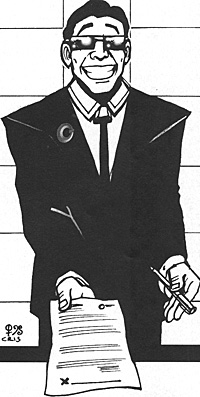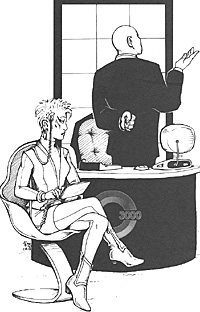 Role-playing games stretch the imagination more than
any other hobby. So, why should a few game designers
have the last word on what is and what is not allowed in
such popular games as Earthdawn, Star Wars, or Call of
Cthulhu?
Role-playing games stretch the imagination more than
any other hobby. So, why should a few game designers
have the last word on what is and what is not allowed in
such popular games as Earthdawn, Star Wars, or Call of
Cthulhu?
This article is intended to provide a tool for GMs who want to add a new twist on their dark future campaigns. While designed to provide a quick creation system for cyberpunk corporation villains, it can also be used for any other manner of evil organization desired for any genre of gaming.
Choosing a Foundation
The first step to creating an organization is conceptual. Don't spend hours deciding everything the corporation does, merely decide upon a basic hook for the new business. This conception could be as simple as a name or what the conglomerate does, or as complex as detailed black ops and the statistics of the major stockholders in the corporation.
The concept should not be extremely complicated. If ideas aren't coming, then try answering a few questions. Do you have something special that you want accomplished with your campaign? Has a gap in the corporate facilities already available suddenly come to your attention? Do you have a name to work with?
Don't be afraid to steal ideas, either. Movies and books are great sources, as long as your players don't know about them (most of the time, low-budget science fiction movies provide the most useful ideas). Looking through magazines can always be useful; just look at the "Reality Check" in Shadis #39 [ed. note - Coca Cola survives the "Corp Wars" and reigns as a supreme mega- corporation]. Or, if you still can't get things flowing, look at the newspaper and television. Real-life corporations such as Viacom or Lanc6me Paris can make for great villains with a little fabrication.
Although it doesn't sound like much, sometimes a name is all that someone needs to propel an idea. Based on my corporate title - Cyberdata 3000 - I can take some pretty good guesses at slogans, commercial jingles, and the company's main resources. At all times, remember what you want accomplished with the corporation.
- d10 area of expertise
1 Cybernetics
2 Computing
3-4 Electronics or Security
5 Information
6 Bioengineering
7 Entertainment
8 Weapons
9 Service (banking, etc.)
10 Specialty (medics, net, etc.)
- d10 defenses
1-3 Extensive covert activities
4-5 Powerful weapons
5-6 Superior Tech
7-8 Special Net Activity*
9 Low Profile
10 Roll Twice
Picking a Poison
When introducing a corporation into the game, the first things that players will want to know is what the villains do - every business has a specialty. Arasaka does security, Bell Atlantic offers telephones, Microsoft rules the computer industry, and the FASA Corporation makes role-playing games. So, like any good business, a corporation must have an area of expertise. Below is a quick table for creating an area of expertise for a corporation.
Decide what a corporation does; think about how it stays ahead of its rivals. The future corporations have to deal with rival businesses, pesky rockerboys, and even the American government. People playing in sciencefantasy campaigns have to worry about magic and powerful creatures in addition to the scheming of a mega-corporation (that wetland down there may be a rich in natural resources, but what if it's infested with orks, trolls, or even a dragon?). How does your corporation deal with its competitors? If you don't have any ideas, roll a die and consult the defenses table.
Your corporation doesn't have to be limited to just one of these defenses, and most intelligent corporates will make sure that their businesses are as versatile as possible. These result merely show what the conglomerate is best known for.
 Who's the Boss?
Who's the Boss?
Now. Who keeps the corporation in business? Every company needs investors. Who are the major stockholders of the corporation? These people may include established NPCs, new villains that the PCs have yet to encounter, or even one of the PCs themselves. The exact number of stockholders and the amount of the company they own should relate to the size of the company.
| d10 | Corp. Size | Number of Investors* | % of Stock** |
|---|---|---|---|
| 1-4 | Small | 4 | 20-30 |
| 5-7 | Moderate | 8 | 15-25 |
| 8-9 | Large | 10-15 | 10-20 |
| 10 | Megacorp | upwards of 20 | 10-15 |
*The number of investors includes only the major players on the corporate field. Most employees of a business usually own at least a little bit of stock.
**Again, this is only the amount of stock owned by major investors. This information can vary. For example, Saburo Arasaka owns less than 20% of his business, although his family together owns almost everything.
While it should not be necessary to detail every personality in the corporation, you should take the time to at least think about the personality of the most important stockholder. Build this character like any PC. Decide on how they came to rule the corporation, and any pertinent history that will affect how they "govern". Any important NPC in a RPG will have a serious degree of depth. Done right, a corporation in a cyberpunk game can have just as much personal attitude.
Sending in the Marines
Finally, determine exactly how much influence this business has in the world. Every good villain needs some way of affecting the world. A quick way to determine a corporation's power is to look at the number of employees and troops.
In the cyberpunk world, corporations often have power on par with some small governments. A major player like Militech also has access to full body cybernetic conversions, powered armor, and maybe even a few nuclear weapons. To be able to effectively compete with such power, your corporation should have a fair number of troops and covert operatives, as well as its own resources to set it apart from others.
The table below shows some basic ratios of troops to the size of the business that they work for. Example: Cyberdata 3000 is a medium-sized corporation. They should have about 50,000 employees, 500 standard troops, and 50 special agents and covert operatives.
| Size | employees | troops | Covert operatives |
|---|---|---|---|
| Small | 15,000 | 150 | 10 |
| Medium | 50,000 | 500 | 50 |
| Large | 200,000 | 2,000 | 100 |
| Megacorp | 1,000,000 | 10,000 | 1,000 |
However, because Pynes focuses more on underhanded schemes, and because Cyberdata 3000 is on the stronger side of medium-sized, these figures are altered. The corporation has roughly 75,000 employees, about half of which are based in the United States - mostly on the western coast tin areas like Los Angeles and Seattle. They have 1,000 troops, and almost as many covert agents. This is rather large given Cyberdata's proportions, and they should probably have a a few financial difficulties from time to time.
Miscellaneous
Finally, just decide anything else that you think will be useful in play. Note some statistics for the standard goons that the players will have to face, as well as some of the major employees. If you still haven't made anything that sets apart the corporation from the others in your world, decide on something now. Fill in a few details that you missed somewhere in these steps. You now have a unique creation that you and your players can spend several campaigns elaborating upon. Keep your business updated, and remember to always expand.
Options
Building a cyberpunk future can sometimes be enjoyable if the players are in on its construction. Designing ten or twelve corporations from scratch and using them as the basis for the entire cyberpunk world gives the players and the GMs something that is theirs to campaign in; and sometimes this is more important than buying pre-built societies at a game store.
The worlds of Judge Dredd, Underground, WEG's CyberPapacy and Nippon Tech, Akira, Frank Miller's Hard Boiled, Strange Days, Apple Seed, Grendel, Blade Runner, and a host of others make for rich societies, within their own subtext - in flavor, and history - and a series of evenings can be devoted to building a perfect gaming society when the right elements are used, and the ideas of everyone are taken into account.
Back to Shadis #51 Table of Contents
Back to Shadis List of Issues
Back to MagWeb Master List of Magazines
© Copyright 1998 by Alderac Entertainment Group
This article appears in MagWeb.com (Magazine Web) on the Internet World Wide Web.
Other military history articles and gaming articles are available at http://www.magweb.com